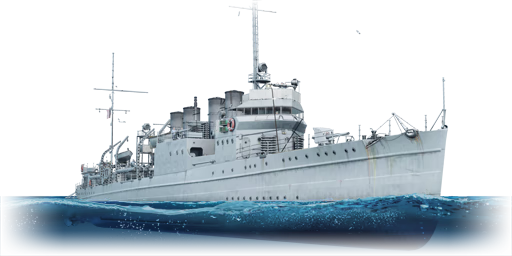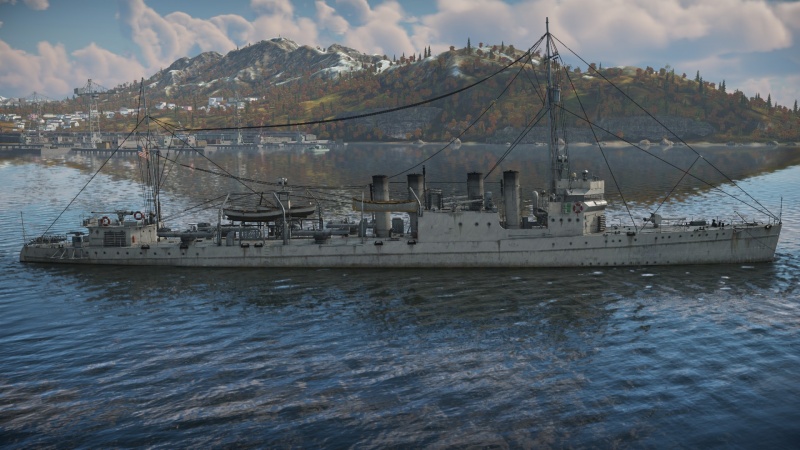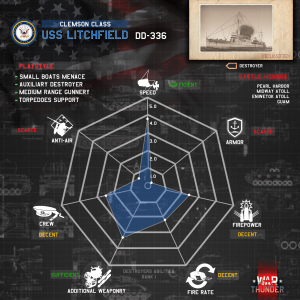USS Litchfield
Contents
Description
The Clemson-class, USS Litchfield (DD-336), 1936 is a rank American destroyer with a battle rating of (AB), (RB), and (SB). It was introduced in Update 1.79 "Project X" as part of the fleet closed beta test.
General info
Survivability and armour
This Clemson has her hull protected by 17 mm of steel and her superstructure protected by 10 mm. With a crew size of 150, she has a similar crew count to other early destroyers, and is tough to destroy if she's downtiered into a match, but will quickly be destroyed against higher rank ships. The smoke funnels and torpedo tubes are easy to knock out if you land centerline shots on her, and the lack of anti-fragmentation armour doesn't help. Her main ammunition storage is just below the waterline, so she can be decently difficult to ammo-rack. Both the primary armament and secondary armament are small, but the two guns in the raised fore section can be knocked out if a shot lands nearby due to their poor armour.
Mobility
| Mobility Characteristics | |||
|---|---|---|---|
| Game Mode | Upgrade Status | Maximum Speed (km/h) | |
| Forward | Reverse | ||
| AB | |||
| Upgraded | |||
| RB/SB | |||
| Upgraded | |||
Four boilers and two geared steam turbines produce 27,000 HP, allowing her a top speed of just under 65 km/h with a spaded vessel. Her rudder shift is 5.4s, which is quite workable for her battle rating and her strange gun layout. She is very average compared to other destroyers, but it serves as a good indication of what to expect for future destroyers.
Modifications and economy
Armament
Primary armament
DD-336 Clemson carries four 102mm Mk.9 cannons. They have a HE shell and APHEBC round available to them, both of which are mediocre shells. It's worthwhile to stay with the HE shell as this Clemson doesn't see well-armoured enemies, so the extra HE filler over the APHEBC round is a bonus. They have a traverse speed of 12 degrees per second, which is good compared to other early destroyers. A reload speed of 7.93s with a stock crew or 6.1s with a fully aced crew is decent, but slow compared to other destroyers of a slightly higher rank. Her shells are decently 'floaty' and require good leading at range, and you will be outgunned by almost every other destroyer of a higher BR. With a maximum elevation of 20 degrees, you cannot target enemy planes effectively. The gun mounts have 5mm of anti-fragmentation armour on each turret. With 1 gun in the front, 1 in the rear, and 1 on each side, you can only bring 3 of 4 guns to a broadside; but, you can swing back and forth to use each side gun effectively.
Secondary armament
This Clemson has a single 3-inch Mk.24 gun on the rear. It can carry HE or APHEBC shells, but as it's a secondary, you may as well use the HE since the AI will gun it for you. The 3 inch Mk.24 reloads in 6.7s with a stock crew and 3.35s with a fully aced crew, making it surprisingly good for dealing with small boats that would out-traverse your main armament. This gun has a traverse speed of 25 degrees per second, so it will be your backup against smaller ships. It also elevates at 25 degrees per second and has a maximum elevation of 70 degrees. The AI may snipe a plane if you're lucky, but that'll be your only AA.
Additional armament
She carries four triple torpedo launchers, utilizing the 21-inch Mk.8 torpedo. Their firing arcs are pretty good, and the sheer number of torpedoes and their positioning - two mounts on each side - means you can zig-zag to drop all twelve torpedoes. The Mk.8 has a good range of 9.1 km, but a very slow speed of 50 km/h and a mediocre explosive load of 146 kg.
Usage in battles
She is good as a learning platform for basic destroyer play. Good at sinking smaller ships because her smaller guns are accurate, with decent traverse speed for the BR and a passable secondary gun. She cannot effectively deal with other destroyers however, as her guns are small and will fail to do much damage to them. Her torpedoes will do good work for area saturation, and using the rudder to swing the ship back and forth will allow you to put most guns on target and use the good torpedo arcs.
Pros and cons
Pros:
- Six torpedoes per side
- Turret traverse is decent compared to other first-generation destroyers
- Decent firing arcs
Cons:
- Slow shell velocity and rate-of-fire, making long-shots difficult
- No anti-aircraft guns, vulnerable to any aircraft
- No armour
- Firepower is woefully inadequate for dealing with later destroyers
History
The Clemson class of destroyers were built between 1918 and 1922, as the last "flush-decker" type in the US navy, an evolution of the Wickes class. They were designed to do anti-submarine combat better than preceding destroyer classes, should the US get involved in another naval war after WW I. The Clemson had the same armament as the Wickes, however, there were provisions for 5-inch guns, which only seven destroyers received. DD-336 in-game, USS Litchfield, was commissioned in May 1920. She helped with humanitarian efforts in Greece and Armenia and was overhauled in 1923. Joining Destroyer Squadron 12, her crew earned money for doing very effective short-range fire. In May 1937, she was designated flagship of Submarine Squadron 4 and participated in drills at and nearby Pearl Harbor. After the attack on Pearl Harbor, she escorted US submarines near the base and conducted anti-submarine patrols. In 1944, she performed convoy escorts to Midway and Eniwetok, rescued aircraft crew, performed exercises, and in at least one case salvaged an aircraft. After escorting a convoy to Guam in March 1945, she was redesignated an auxiliary; she was ordered to be decommissioned in November 1945 and was scrapped in March 1946.
Media
- Skins
See also
- Related development
External links
| Mare Island Navy Yard | |
|---|---|
| Gun Destroyers (DD) | |
| Clemson-class | USS Litchfield |
| USA destroyers | |
|---|---|
| Clemson-class | USS Welborn C. Wood · USS Barker · USS Litchfield |
| Farragut-class | USS Aylwin |
| Bagley-class | USS Bagley |
| Porter-class | USS Porter · USS Phelps · USS Moffett |
| Somers-class | USS Somers · USS Davis |
| Fletcher-class | USS Fletcher · USS Bennion · USS Cowell |
| Allen M. Sumner-class | USS Sumner |
| Gearing-class | USS Gearing · USS Frank Knox |
| Mitscher-class | USS Mitscher · USS Wilkinson |






